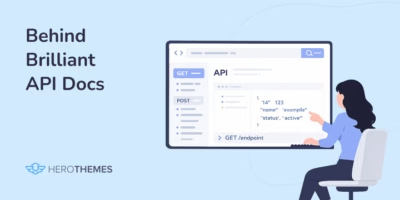Zoho Desk Review 2026: Powerful Yet Affordable!
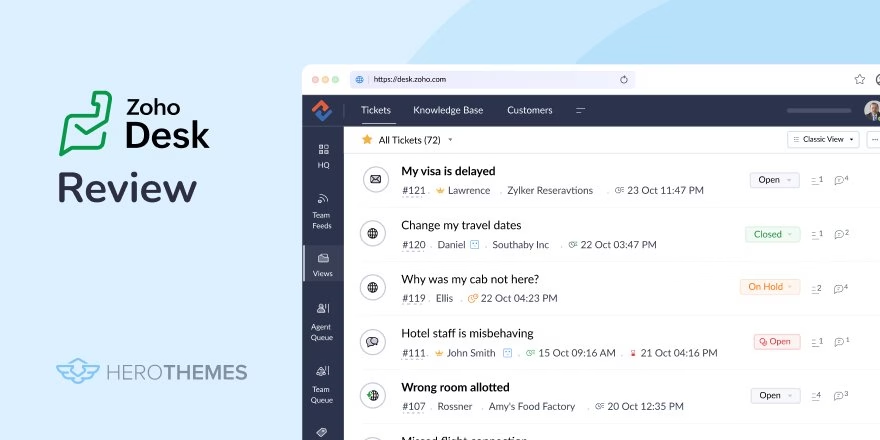
Zoho Desk is an online help desk software that centralizes customer support tickets from multiple channels into one system. It’s part of the broader Zoho ecosystem, integrating seamlessly with Zoho CRM and other Zoho business apps.
The platform is often touted as the industry’s first “context-aware” help desk. It brings in relevant customer context (like their past interactions and data from the CRM) right into the support ticket view.
In plain terms, Zoho Desk’s goal is to help your support agents see who the customer is and what their history is, so they can resolve issues faster and more personally.
This Zoho desk review is written from my perspective as a Customer Support Manager who has tested Zoho Desk extensively, with an eye on what small businesses and startups need in a customer support tool.
I’ll also highlight the recent updates and how that has changed the experience, and compare Zoho Desk to other popular support tools including Zendesk, Freshdesk.
My aim is to give you an honest, easy-to-read review so you can decide if Zoho Desk is the best support ticket system for your small business or startup.
In This Guide

We rigorously test and research every product that we recommend through HeroThemes. Our review process. We may also earn a commission if you make a purchase through our links.
Zoho Desk Review Quick Summary
Zoho Desk fits best with small to mid-sized teams who need a capable, multi-channel support system and are mindful of budget. Solo folks and very tiny teams might find it a bit much unless they want to future-proof their support.
What Users Like (Pros)
- Affordable, value for Money
- Integration with the Zoho ecosystem
- Multi-channel and collaboration
- Customization and flexibility
- Self-service and knowledge base
- Automation and productivity features
- Reliable and functional
What Users Dislike (Cons)
- Steep learning curve and cluttered UI
- Performance issues at scale
- Mobile app limitations
- Customer support from Zoho
- Limited third-party integrations
- Complexity of advanced features
- Email configuration quirks
It’s important to weigh these pros and cons against your team’s priorities.
In my opinion, the pros easily outweigh the cons for a typical small business: Zoho Desk offers tremendous functionality and value, with the trade-off of a learning curve and some occasional rough edges.
Many of the cons (interface, complexity) are front-loaded problems, you feel them at the beginning. Whereas the pros (efficiency, integration, cost savings) accrue over time as you and your team master the tool.
To provide a well-rounded review, I’ve looked at many real user opinions from sources like G2, Capterra, and others. What do actual small business and startup teams say about Zoho Desk? And compared them with my own opinions.
User Ratings: Zoho Desk is generally well-regarded. On G21 Crowd with 6,508 reviews, it scores around 4.4 out of 5 stars (with Freshdesk at 4.4 for comparison) Capterra and TrustRadius show similar ratings in the 8/10 or 80-90% satisfaction range.
Zoho Desk Review 2026
Now, let’s take a closer look at each aspect of the Zoho Desk software.
1. User Interface and Experience (UI/UX)
Zoho Desk’s user interface has evolved recently, getting a significant overhaul around late 2024 to early 2025.
The new interface (built on Zoho’s “DOT” design system) introduced a cleaner, more modern look with unified navigation across modules.
For example, agents can now switch between Tickets, Knowledge Base, Customers, Reports, etc., with a consistent menu layout, which reduces confusion. The redesign also added much-requested Dark Mode and a variety of theme options to let you personalize the look of your help desk.
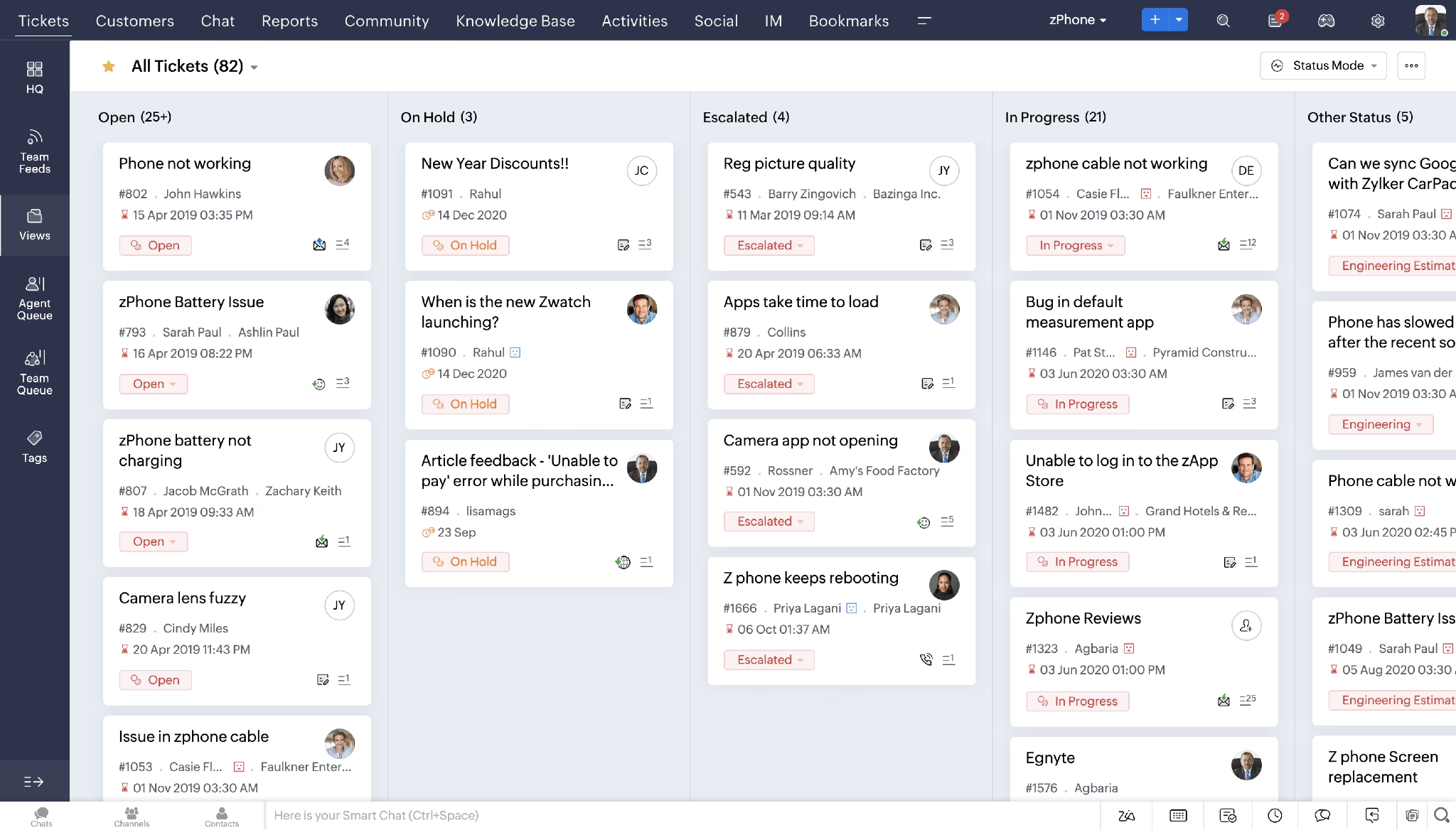
Despite these improvements, new users might still find Zoho Desk’s interface a bit overwhelming at first.
When I first tried Zoho Desk with tickets (as it should be), I was greeted by a busy screen full of small icons, menus, and options. The ticket view packs a lot of information onto one page, from contact details and related tickets to AI suggestions and numerous action buttons.
It’s great that everything an agent might need is visible, but the layout isn’t as minimalist as some competitors.
In day-to-day use, I found the user experience to be generally solid once I got used to the layout.
Zoho Desk Mobile experience
Zoho Desk provides mobile apps for iOS and Android so you can respond to tickets on the go.
The mobile app is functional for basic actions (viewing tickets, replying, assigning, etc.), but it is not as full-featured as the web version.
2. Exploring Zoho Desk’s Core Features
One reason Zoho Desk’s interface is so packed is that the software is loaded with features.
For a small-business-oriented help desk tool, Zoho Desk doesn’t skimp on capabilities. It provides many of the same core features you’d expect in enterprise customer support software.
Multichannel Ticketing
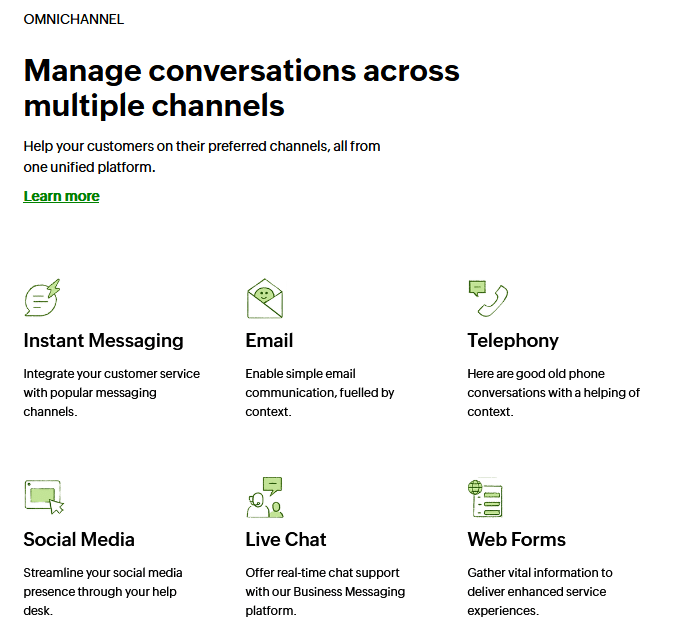
Zoho Desk lets you manage support tickets from email, web forms, live chat, phone, social media, and even WhatsApp, all in one place.
This omnichannel customer service approach is great for small businesses that want to offer help on multiple channels without juggling separate tools.
All conversations funnel into the Zoho Desk dashboard, and agents handle them in a unified interface.
During my testing, I found the email and live chat channels especially easy to use. Social media integration was a bit trickier to set up (requires linking accounts and setting permissions), but once configured, it’s convenient.
Keep in mind that some channels (like WhatsApp or telephony) might require add-ons or higher-tier plans. Overall, Zoho Desk’s multichannel support ensures you can be everywhere your customers are with minimal effort.
Ticket Management and Organization
At its heart, Zoho Desk is a ticket management system. It automatically converts customer inquiries from different sources into tickets and keeps them organized.
- You can categorize tickets by department, product, or priority.
- The system supports SLAs (Service Level Agreements) and escalation rules, so you can define how quickly tickets should be responded to or resolved, and get alerts if they breach those targets.
- Useful feature to link related tickets.
- In 2024, Zoho added parent-child ticketing, which means you can link tickets together in a hierarchy if, say, they’re all about the same issue or one is a follow-up to another. This helps agents see context and avoids duplicate work.
- Mass actions and scheduled replies: Agents can select multiple tickets and send a bulk response, or schedule a reply to be sent at a specific time.
- Team Feed: A collaborative thread where agents and managers can at-mention each other on a ticket internally, much like a private chat
All these tools help streamline the day-to-day handling of support inquiries.
Knowledge Base and Self-Service
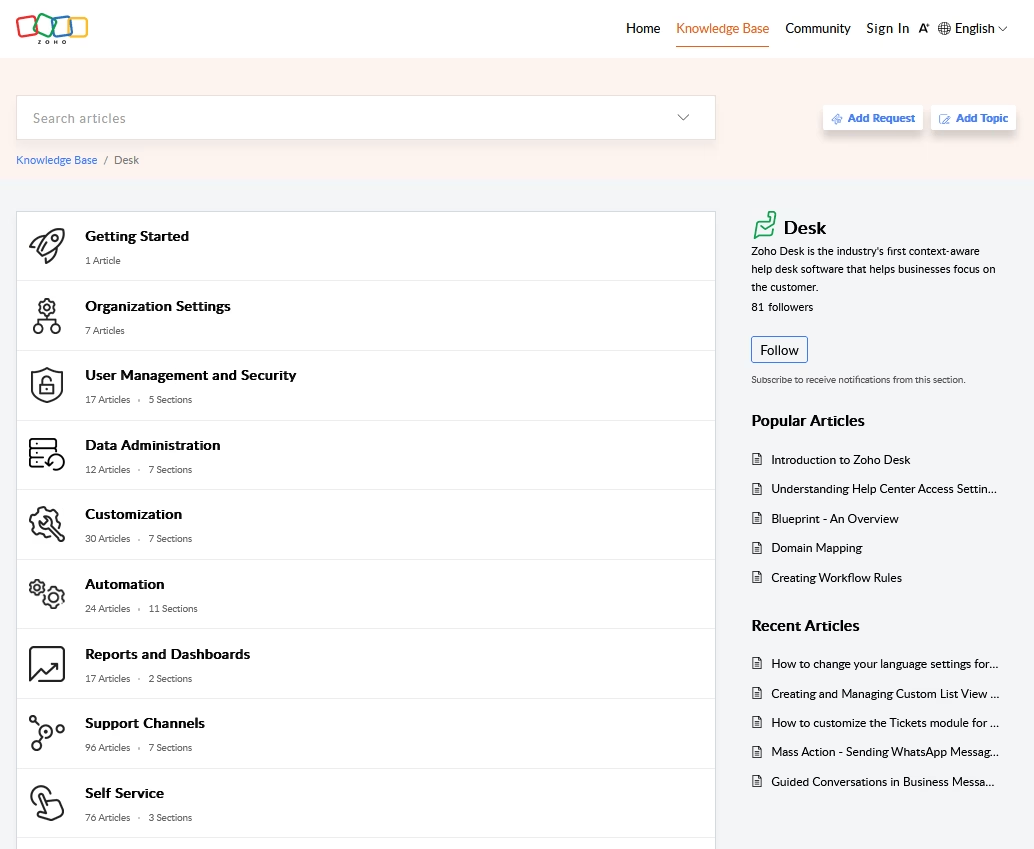
Zoho Desk includes a Knowledge Base (KB) module, allowing you to create help articles and FAQ sections for customers. This is accessible via a self-service customer portal, which you can host on a Zoho subdomain or map to your own domain.
- The knowledge base supports organizing articles into categories and sections.
- Customers can search for answers before submitting a ticket.
- Support for multilingual content.
- The knowledge base editor itself is pretty straightforward.
- Customer feedback functionality for articles. Like upvote/downvote or “Was this helpful?” prompts) to gauge which content is effective.
In practice, having a well-stocked knowledge base reduces ticket volume because customers often find answers on their own.
I also liked the community forums feature Zoho Desk offers. You can host user discussion forums for peer-to-peer support. Though this is something not every small business will use.
Overall, the important help desk functionalities in Zoho Desk are robust.
3. Automation and Workflows
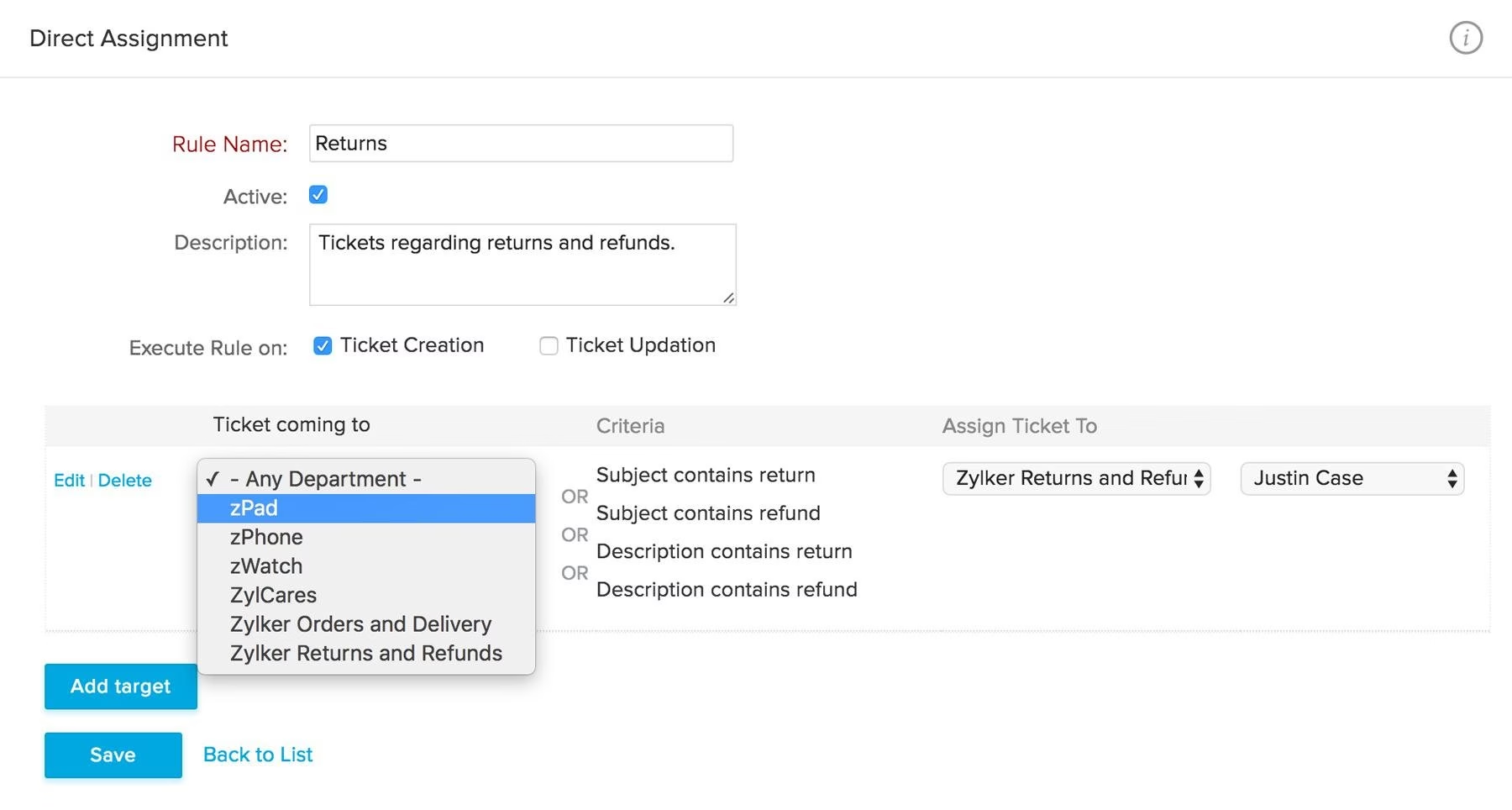
For a small business tool, Zoho Desk impresses with its automation capabilities.
Here are some Zoho Desk automation features that stand out:
- Workflow rules to trigger actions based on ticket events or criteria. For example, you can configure a rule to automatically assign any ticket with the word “billing” in the subject to our billing specialist, and to tag it as “Billing Issue”.
Explore: Best Billing Email Subject Lines: Templates and Best Practices - SLA and Escalation setup: you define your business hours and response time targets, and Zoho will automatically escalate (e.g., notify a manager or bump priority) if a ticket isn’t answered in time.
- Blueprint feature. Blueprints let you enforce a defined process or sequence of steps for certain tickets. Think of it as a workflow builder for ticket life cycles. You can ensure agents follow specific steps (with validations at each stage).
- Zia – AI Assistance:“Zia” is Zoho’s AI assistant that’s baked into Zoho Desk (Enterprise edition). Initially, I was skeptical about how useful an AI would be for a support team, but Zia turned out to be a very interesting helper. Zia can do a bunch of things:
- automatically tag or categorize incoming tickets
- Suggest relevant knowledge base articles to agents
- Provide reply suggestions
- Analyze ticket sentiment (detect if a customer sounds angry or happy).
4. Customization and Extensions
Zoho Desk allows a high degree of customization, which can be a double-edged sword.
On one hand, you can tailor the system to your exact support process. On the other hand, too much customization can be complex.
For example:
- You can add custom fields to tickets.
- Define custom ticket layouts for different departments.
- Build custom modules to store additional data.
Zoho Desk has a Marketplace with pre-built extensions and integrations (both by Zoho and third parties).
There are plugins for connecting Slack, Jira, Trello, Shopify, etc.
5. Reporting and Analytics
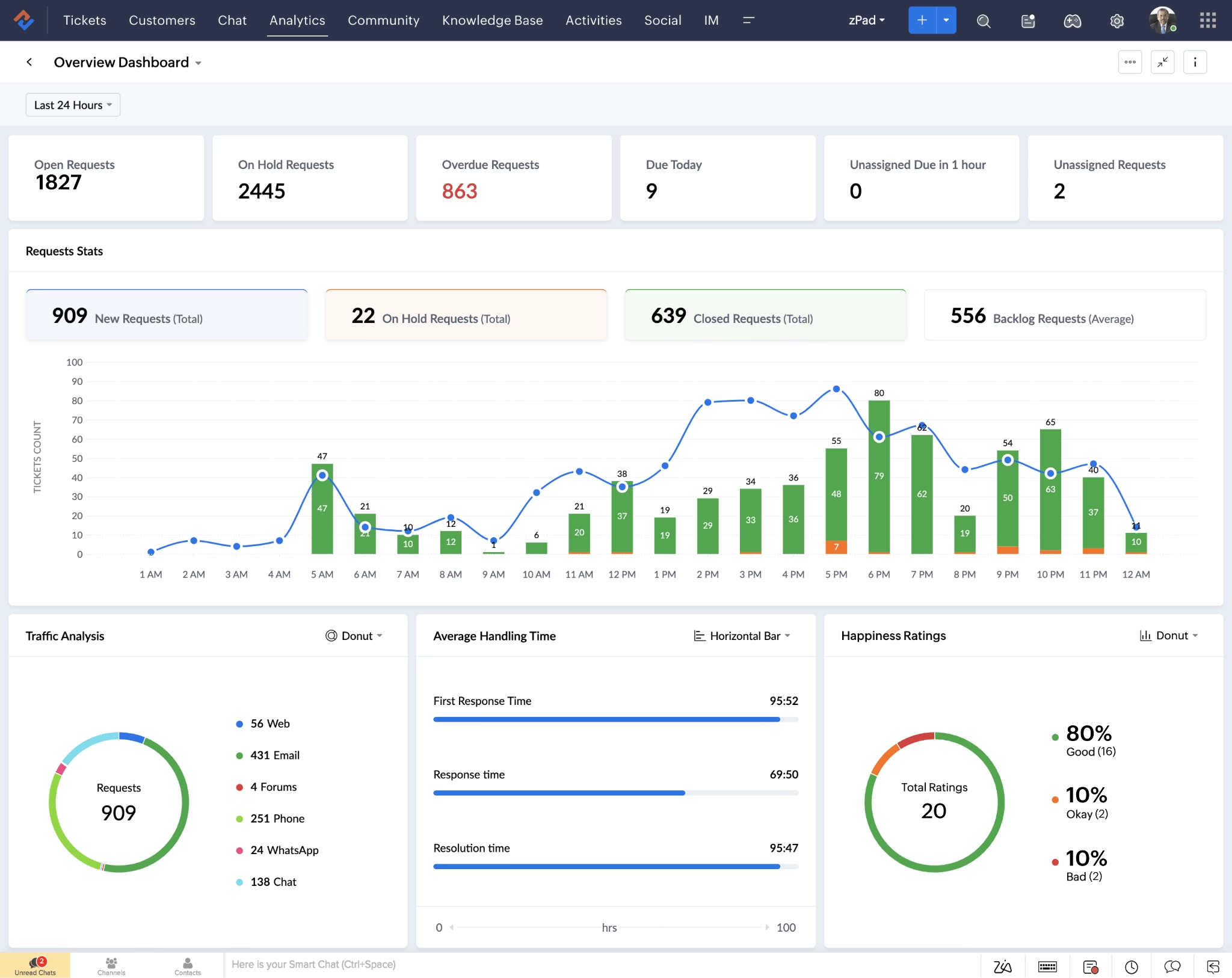
Any serious support tool should help you track how you’re doing, and Zoho Desk provides a decent set of reporting and analytics tools.
In the dashboard, there’s a section called “Reports” or “Dashboards” where you can see various metrics about your tickets and team performance.
Out of the box, Zoho Desk comes with pre-built reports for things like:
- Number of tickets received, resolved, and pending
- Average response times
- Customer happiness ratings
- SLA compliance
- Agent-specific stats (like how many tickets each agent closed).
These reports can be viewed as charts or tables, and you can filter them by date range, agent, department, etc.
One feature I like is the “Headquarters” view (often the default dashboard), which gives a real-time snapshot of your support operation. It shows things like current open ticket count, how many tickets came in today vs. yesterday, and which channels are most active. It’s a quick health check for your support.
If you need to dig deeper, Zoho Desk allows custom reports. On Professional and Enterprise plans, you can create your own reports with the exact metrics you want.
Customer feedback and ratings
Zoho Desk has a built-in customer happiness rating system: when you close a ticket, you can have the system automatically send a survey email or a simple “Were you satisfied? Yes/No” email to the customer.
The results of those are tracked so you can see your average happiness score.
It’s a good lightweight way to gauge satisfaction. In reports, you can correlate these ratings with agents or ticket types to spot issues.
Overall, for a startup or small team, Zoho Desk’s analytics will help you answer the key questions:
- How fast are we responding?
- Is our volume going up or down?
- Who are my top performers?
- What are customers happiest or unhappiest about?
- It provides those answers in a clean way.
And if you need more, Zoho’s ecosystem has tools to expand your analytical powers.
In summary: Zoho Desk packs all the core features you’d expect in a top-tier help desk: from multichannel ticket management and self-service knowledge base to automation galore and AI assistance. This is impressive considering its pricing (which we’ll discuss soon).
6. Scalability: Built to Grow
One of the hallmarks of Zoho Desk is that it can scale with your team.
Whether you’re a solo founder handling support yourself or a growing business with a dedicated support department, Zoho Desk is built to accommodate.
Here are some aspects of scalability and customization to consider:
- Team Size & Collaboration: Zoho Desk supports from 1 up to many agents. Even the free plan allows 3 agents, which covers a typical small startup team. You can create multiple departments within Zoho Desk if you want to segregate tickets (for example, a “Tech Support” department and a “Customer Success” department), each with its own inbox and workflows.
- Customization for Business Processes: As touched on earlier, Zoho Desk offers extensive customization. From custom fields and statuses to entire modules, you can bend the tool to fit your business.
- Performance and Reliability: From a scalability perspective, it’s important that the app remains fast as the data grows. I found Zoho Desk’s performance to be fine for the most part, though occasionally certain pages (like the list of tickets with many records, or heavy reports) took a few extra seconds to load.
- Integration with Other Systems: The software integrates exceptionally well with Zoho’s own suite, which is great if you’re using Zoho CRM, Projects, Invoice, etc.
- Security and Permissions: Zoho Desk offers features like GDPR compliance tools, data retention settings, and role-based access control. A 2024 update added encryption for certain sensitive fields (like contact info) in the database for security.
In short, Zoho Desk can grow from a startup solution to a full-fledged enterprise solution. It’s used by teams of all sizes. Zoho itself boasts that over 100k businesses use it.

7. Customer Support and Service from Zoho
As a help desk software, one ironic thing we have to consider is: how good is the vendor’s own support if you need help? And what resources are available to learn the tool?
Zoho, as a company, provides multiple support channels for Zoho Desk users:
- They have 24/7 email and phone support for paid customers
- Pretty extensive online help center with guides, FAQs, and community forums.
In my experience, the Zoho Desk knowledge base (for the product itself) is very detailed. I often found answers to configuration questions by searching their help articles.
In summary, Zoho’s support for Zoho Desk is adequate but perhaps not exceptional. The self-service resources (docs, videos, community) are excellent. I’d rate those very highly for helping yourself.
Direct support is there 24/7 for paid users but may not be lightning-fast for non-critical issues.
8. Pricing and Value for Money
Zoho Desk generally offers a Free plan and several paid tiers (Express, Standard, Professional, Enterprise, and there’s also an “Ultimate” in some regions).
| Plan | Price/Agent (Monthly) | Best For |
|---|---|---|
| Free | $0 | Solo founders (up to 3 agents) |
| Express | ~$7 | Tiny teams wanting multi-channel basics |
| Standard | ~$14 | Small teams ready for automation |
| Professional | ~$23 | Mid-sized teams needing telephony, reports |
| Enterprise | ~$40 | Larger teams wanting AI, sandbox, BI tools |
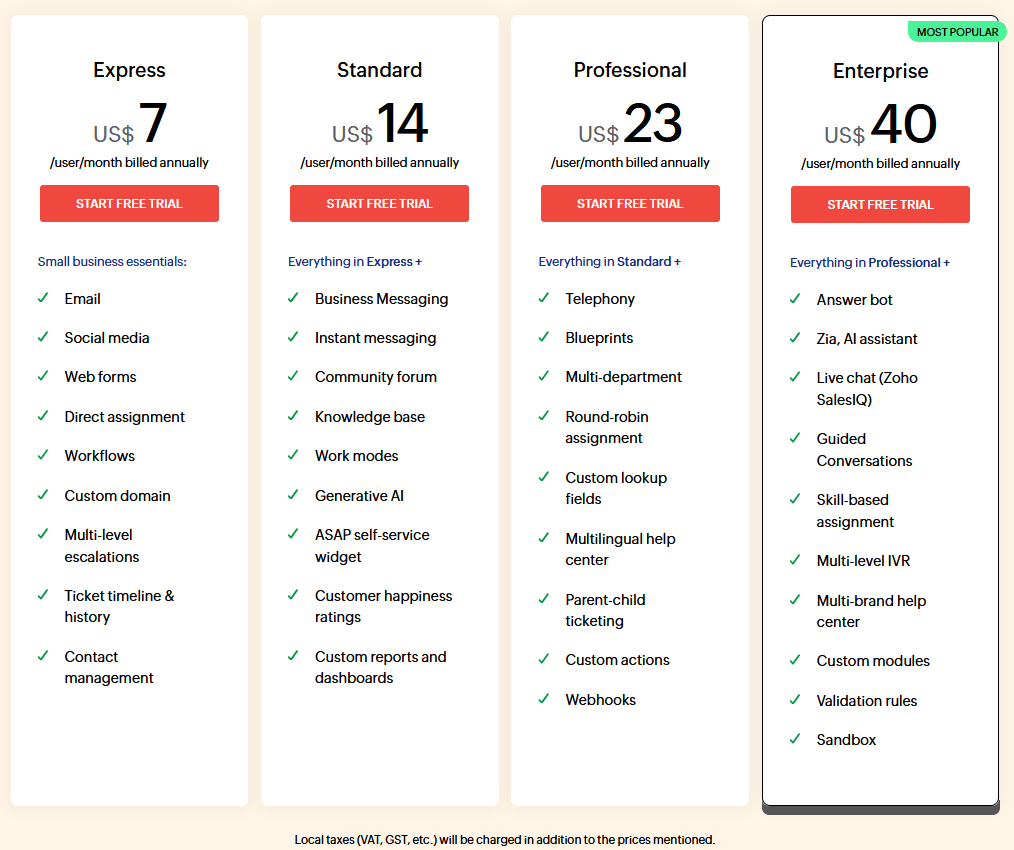
Zoho also often provides a 15-day free trial for any paid plans.
Value Assessment: Are the paid plans worth it?
In my opinion, yes. Especially Express or Standard for a small business. Zoho Desk’s paid plans are competitively priced and pack a lot of functionality.
For a startup, being able to start free and then move to a $7/agent plan as you hire support staff is a gentle gradient, not a big bill shock. And that Express plan offers essentially everything you need to run a multi-channel support operation for a small team (except the AI stuff, which you might not need immediately).
Free vs Paid: The free plan of Zoho Desk is one of the better free offerings in help desks. Because not many competitors offer free agents with a knowledge base. It’s great for very small-scale usage.
But of course, it’s very limited compared to paid plans. For instance, limited automation, reporting and other features.
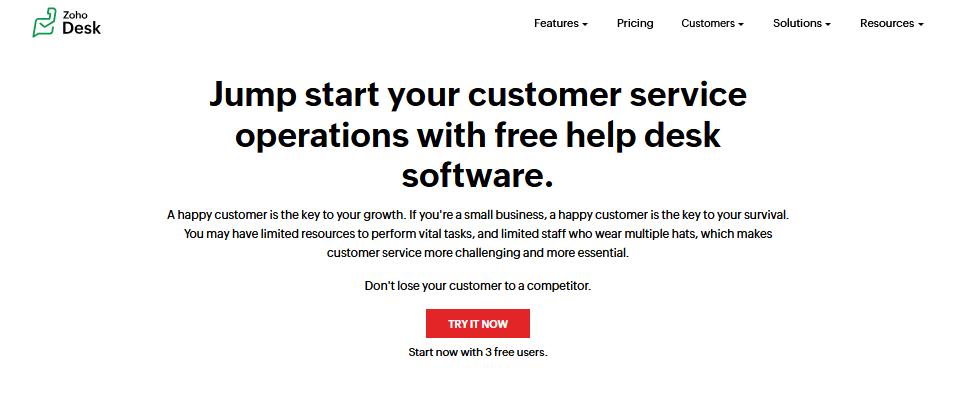
Hidden costs or considerations: One should consider if any add-ons cost extra. For Zoho Desk, most features are in the tier cost. They don’t charge extra for, say, additional knowledge base or reports.
Contrast that with something like Zendesk, where you might pay for a Guide (knowledge base) as an add-on in some older plans, or pay for more AI answers.
Zoho’s approach is more all-inclusive at each tier.
Overall, Zoho Desk delivers a high ROI for its cost. It’s positioned as a help desk for those who want 80-90% of the big features at maybe 20-30% of the cost of big-league solutions. That’s a trade-off many small businesses are happy to accept.
Zoho Desk vs. Zendesk vs. Freshdesk (How It Stacks Up)
When considering help desk software, you’ll inevitably compare Zoho Desk with the big names in customer support tools. Especially Zendesk and Freshdesk and perhaps others like Help Scout or Jira Service Management.
As someone who has used or trialed many of these, here’s how Zoho Desk compares in key areas:
| Feature | Zoho Desk | Zendesk | Freshdesk |
|---|---|---|---|
| UI/UX | Moderate learning curve | Most polished | User-friendly |
| AI Tools | Zia (good, free at Enterprise) | Add-on cost | Freddy AI included in higher plans |
| Multichannel | Yes (wide range) | Yes | Yes |
| Pricing | $$ | $$$ | $$ |
| Integrations | Best with Zoho apps | Huge marketplace | Moderate |
| KB Tools | Included | Often extra | Included |
- Ease of Use: Zendesk is often praised for its polished and user-friendly interface. Indeed, Zendesk’s UI is more intuitive and less cluttered than Zoho’s.
- Features and Channels: All are feature-rich; Zoho Desk gives you more included at lower price, Zendesk gives you the most advanced capabilities (at a cost), and Freshdesk is somewhere in between with strong features and good UI.
- Automation and AI: All three offer automation rules/macros; no big difference there. One thing: Freshdesk’s higher plans include a feature called Freddy Copilot and other AI tools that are quite powerful (like AI triage, similar to Zia’s field prediction, and sentiment analysis). If AI is critical to you, Zendesk and Freshdesk are equally strong, and Zoho is catching up fast
- Integrations and Ecosystem: Zendesk has the edge with the largest marketplace of integrations. It’s been the industry leader, so everyone integrates with Zendesk.
- Pricing and Value: This is where Zoho Desk really shines. Simply put, Zoho gives you more for less.
Summary of Zendesk vs Zoho Desk
Zendesk is the powerhouse with a refined user experience and advanced features, ideal for organizations that have a larger budget and need that extra sophistication, particularly in reporting and customization.
Zoho Desk is better suited for organizations on a budget that are willing to handle a bit of complexity to enjoy a solid solution.
Summary of Freshdesk vs Zoho Desk
Freshdesk is often seen as an alternative in the same league as Zoho. The choice here can come down to the ecosystem and specific needs. Freshdesk might have an edge if you want something very easy and if you like Freshworks’ suite (they have CRM, etc., but not as extensive as Zoho’s suite). Freshdesk’s AI (Freddy) is also quite lauded.
On the other hand, Zoho Desk might win if you are already using Zoho apps or if you need the absolute most cost-effective deal with broad features.
WordPress-Native Zoho Desk Alternatives
While tools like Zoho Desk, Zendesk, and Freshdesk are standalone platforms, there’s another category of help desk solutions for those who run their websites on WordPress.
Two notable ones are Heroic Inbox and Heroic Knowledge Base, which are WordPress plugins by HeroThemes. It’s worth considering these two options, if you want a simple help desk system, without fancy features that you might not use.
1. Heroic Inbox: Help Desk Solution
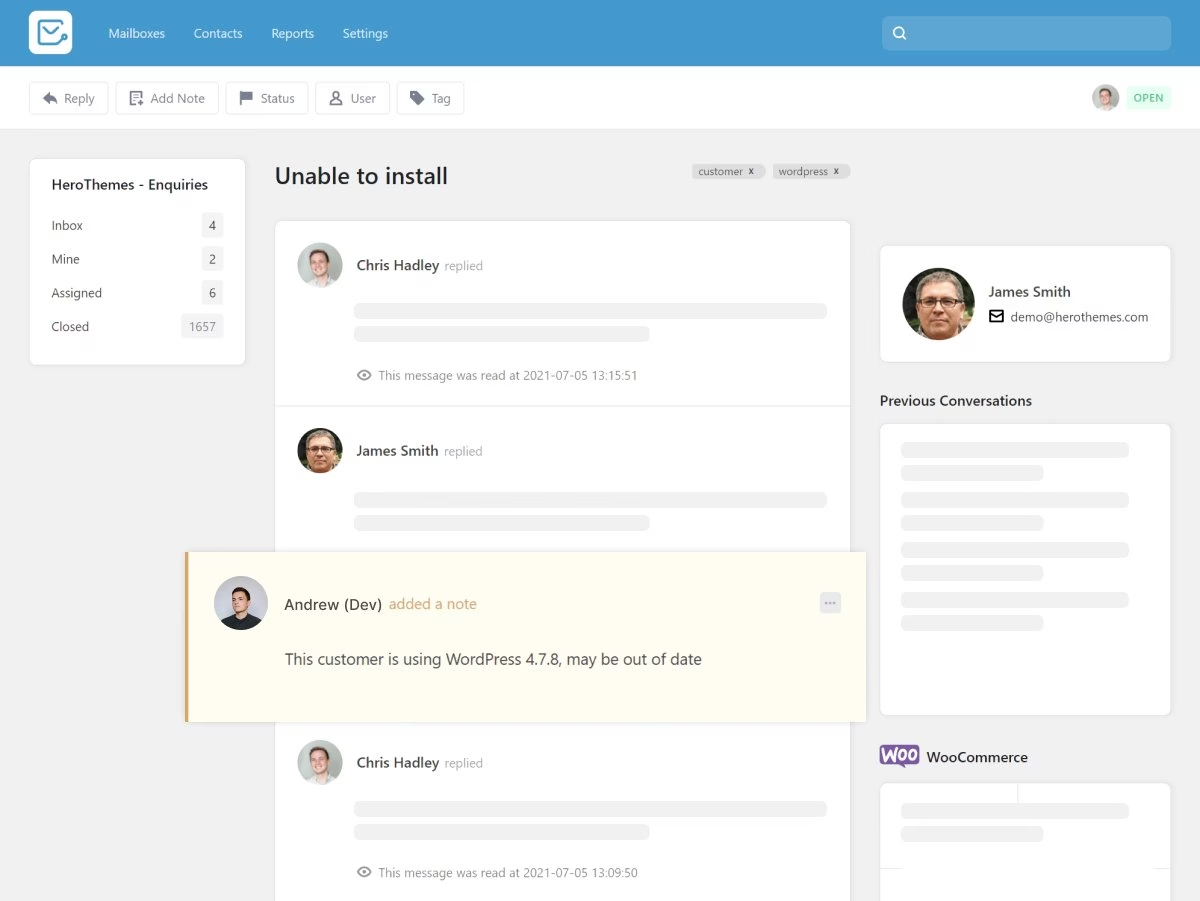
Heroic Inbox is essentially a help desk plugin that transforms your WordPress dashboard into a support inbox.
Key Features
- You can have multiple inboxes (support@, sales@, etc.)
- Unlimited users and tickets
- Saved replies (canned responses)
- Auto-responders
- Internal notes on tickets
- Collision detection to prevent two agents from replying to the same message
- WooCommerce and Easy Digital Downloads Integrations
Heroic Inbox pricing starts at $199.50 per year. This includes all the essential features.
Unlike Zoho Desk, you can use Heroic Inbox with unlimited users and for unlimited tickets.
2. Heroic Knowledge Base: Knowledge Base Solution
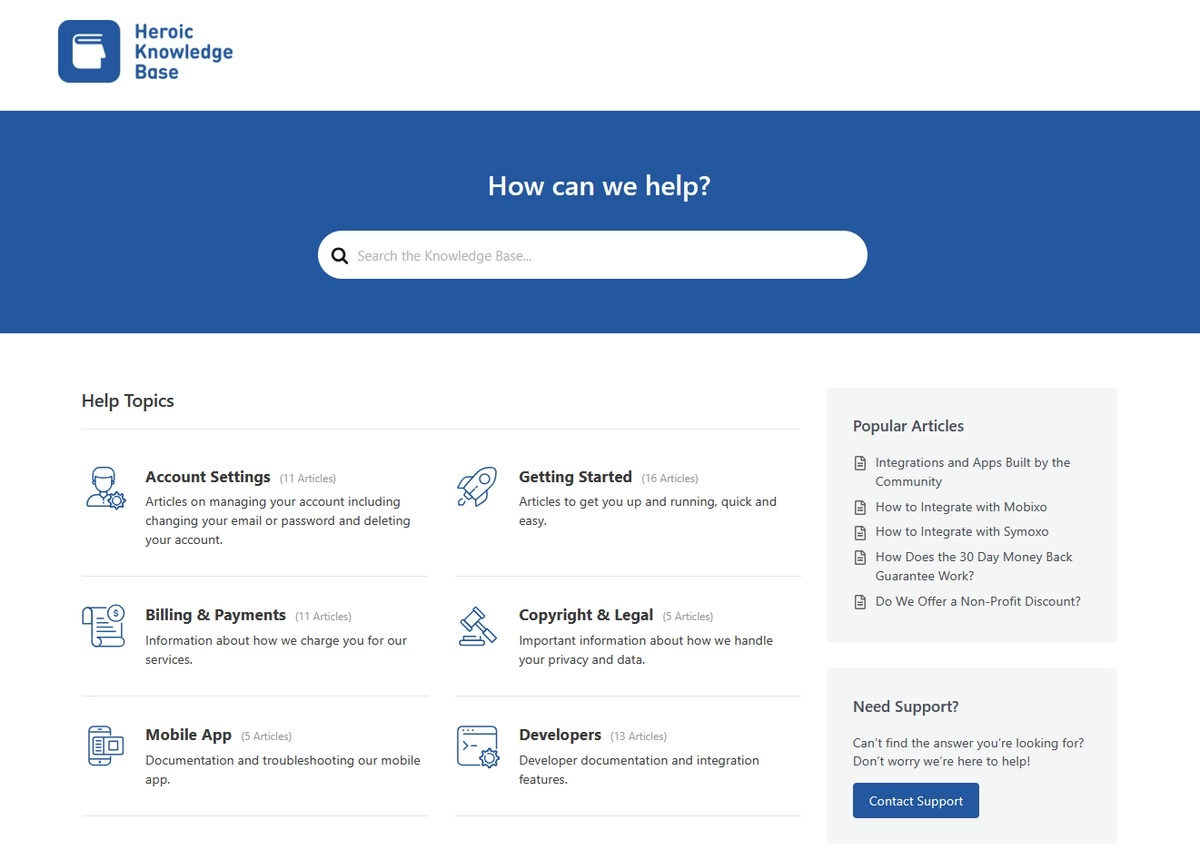
Heroic Knowledge Base (Heroic KB) is the companion plugin for self-service. It allows you to create a knowledge base on your WordPress site.
Essentially, your FAQ and help articles can live on your own domain, integrated with your website’s look and feel. This is a big plus if you want your help center to be part of your main site (and improve SEO for your support content).
Key Features
- Instant search suggestions as you type
- Categorization
- Analytics and Reports
- Advanced WordPress block editor
- Customize the design as needed
- AI Assistance: ChatGPT based AI assistance to answer customer queries.
Heroic Knowledge base pricing starts at $67/year.
Affordability compared to Zoho Desk:
Imagine you have 3 agents, Zoho Desk Standard would be $14×3 = $42/month, which is about $504/year.
So, the WordPress solution could be half the cost, or even less if you have more agents, since WP plugin cost stays the same.
For a small business on a tight budget, that pricing model is very attractive. There’s also no user limit or ticket limit, so it’s very scalable at no extra cost.
Zoho Desk vs Heroic Inbox/ Knowledge Base: If you value working inside WordPress and want a simple, flat-cost solution, Heroic plugins are fantastic.
Final Thoughts
Zoho Desk is a powerful yet affordable help desk solution that brings enterprise-grade support tools within reach of small businesses and startups.
After extensive hands-on testing and weighing it against alternatives, here’s my honest take:
Zoho Desk is one of the best support ticket system choices for small businesses and startups that want big capabilities on a small budget.
It’s clear, honest, and reliable in what it provides. No flashy gimmicks, just a well-rounded help desk platform that you can tailor to your needs.
Yes, you’ll invest some time to configure it and learn it, but the payoff is a highly organized support process and happier customers.
Furthermore, you can explore simple solutions like the Heroic Inbox and Knowledge Base. They are easy to use, affordable, and scalable. All you need are core help desk features, packed in simple workflows, and these tools are very capable at it.
Now over to you: What do you think about Zoho Desk? Have you tried it, and what is your opinion? Do share your thoughts by commenting below.
Further Reading
Missive Review 2026: A Worthy Shared Inbox for Small Businesses
8 Help Scout Alternatives: Best Budget-Friendly Help Desk Solutions
25 Help Desk Software for Small Businesses
How to Improve Help Desk Support: 10 Best Practices
11 Best Free Remote Customer Support Software


